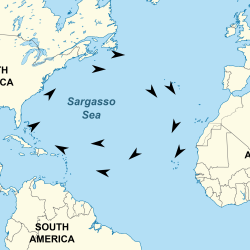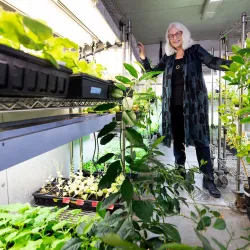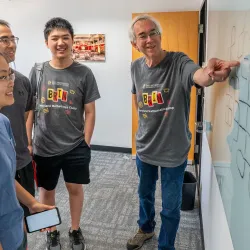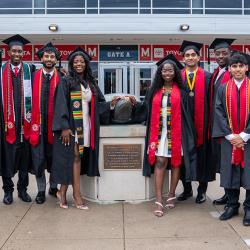Unplanned Paths Lead Back to Maryland
They have never met in person, but Andrew Balo, B.S. ’70, microbiology, and Nicholas Simon, B.S. ’76, microbiology, have more in common than their University of Maryland degrees. After successfully helping biotech startups take new health care technology and treatments to market, both decided they wanted to give back to their alma mater in a big way.
About a year ago, after several phone conversations, Balo and Simon agreed to team up to make a joint $1 million gift to establish the college’s first endowed life sciences chair. In September, their gift received a $1 million match through the Maryland E-Nnovation Initiative Fund. The program, launched last year, adds to private funds raised in support of endowed professorships and chairs in scientific and technical fields at Maryland’s higher education institutions.
 The newly created Andrew and Mary Balo and Nicholas and Susan Simon Endowed Chair will strengthen the college’s ability to retain or recruit an outstanding life sciences faculty member with a focus on human health and/or disease.
The newly created Andrew and Mary Balo and Nicholas and Susan Simon Endowed Chair will strengthen the college’s ability to retain or recruit an outstanding life sciences faculty member with a focus on human health and/or disease.
“We both wanted to make contributions to the University of Maryland, primarily to recognize the impact the university had on our lives,” explains Simon. “And we wanted the funds to go toward enhancing human health.”
“The future of identifying and treating diseases is going to take place at the cellular level and through application of translational medicine, so I wanted to help Maryland bring in more expertise in this area,” says Balo.
Balo and Simon both started their undergraduate years at Maryland with life plans that would change completely after taking a couple of introductory life science courses.
Balo came to College Park from Pittsburgh, with plans of becoming an engineer. Three years into his engineering major, he took some elective science courses.
 “Right then, the light bulb went on in my mind,” Balo says. “These courses changed my path and my life. I really wanted to get into health science and learn about different diseases. Courses in virology, immunology and biochemistry just heightened my interested in the health-related sciences.”
“Right then, the light bulb went on in my mind,” Balo says. “These courses changed my path and my life. I really wanted to get into health science and learn about different diseases. Courses in virology, immunology and biochemistry just heightened my interested in the health-related sciences.”
Over the next 40 years, Balo applied the science he learned at Maryland to the business of health care, with established and startup companies. Today, he works at Dexcom, a startup that developed a continuous glucose monitoring device that can dramatically improve the daily lives of people with diabetes. As executive vice president of clinical, regulatory and quality, Balo oversees all of Dexcom’s clinical trials, statistical analyses, worldwide regulatory affairs and quality operations, and is widely regarded as an industry expert in regulatory and clinical strategies. He has also participated on many Food and Drug Administration advisory panels.
Balo has also been instrumental in bringing other new medical devices to the market, including a neurological cooling device, mechanical and tissue-based heart valves, pacemakers, pacing leads and a 3-D electrophysiology mapping device. But he also admits that he failed twice at his first two startups.
“I’d encourage students to be persistent, to challenge current thinking and to think outside the box when it comes to their ideas and research,” says Balo. “Look for new ways to apply what they’re learning to solve real-life problems.”
A native of Timonium, Maryland, Simon also ended up in a place he didn’t imagine when he came to Maryland with plans to go to medical school.
“I hadn’t heard of microbiology, but when I took the ‘Introduction to Microbiology’ course, I fell in love with it and it became my lifelong career,” says Simon, who followed up his microbiology degree with an MBA from Loyola University when the field of biotechnology was emerging.
“I started with a biotech company in the D.C. area and then went out to the Bay Area where the biotech boom was beginning in the early ’80s,” recalls Simon. “All the companies that were raw startups had this great vision of applying newly discovered techniques to all kinds of things, from medicine to industrial chemicals to agriculture. Everybody was trying to figure out what niche their little company could pursue.”
Simon has since acquired more than 30 years of operating and investment experience in the biopharmaceutical industry, including at Genentech, where he was vice president of business and corporate development. There, he played an integral role in the acquisition, development and approval of the company’s blockbuster cancer products Rituxan, Avastin and Herceptin. Today, he is managing director of Clarus, a health care investment firm he co-founded in 2005.
“We invest in startup companies and even established companies to fund the advancement of science to produce drugs to treat significant unmet medical needs,” Simon explains. “Probably the latest one that’s proven to be transformative is a drug called Imbruvica that’s been shown to dramatically extend the lives of leukemia and lymphoma patients.”
Just like their careers, Balo and Simon’s original plans to give to the college separately took a different turn. Balo had already donated the money for a professorship when he got a call from Jayanth Banavar, dean of the College of Computer, Mathematical, and Natural Sciences at UMD, who was with Simon in San Francisco. Simon said he was willing to match Balo’s donation to give their gifts more clout and impact. All that was needed was a green light from Balo.
“The thought behind it was that we needed a bigger commitment if we really wanted to bring on a top-notch faculty member and really enhance the life sciences at the University of Maryland,” says Simon. “We decided to come together and pool our resources to enable the dean to bring on a professor of even higher stature than he had envisioned.”
Balo agreed, and the two families joined forces.
“We embraced the opportunity to give back to the university that enabled us to get to where we are today in our careers,” Balo says. “We hope our gifts will enable future life science students at Maryland to have even more opportunities than we did and to become leaders in the health sciences.”
To read more about the matching funds awarded by the State of Maryland for this endowed chair, visit https://cmns.umd.edu/news-events/news/21-million-state-maryland-will-match-private-donations-two-endowed-chairs-umd.
Written by Ellen Ternes
This article was published in the Fall 2016 issue of Odyssey magazine. To read other stories from that issue, please visit go.umd.edu/odyssey.







